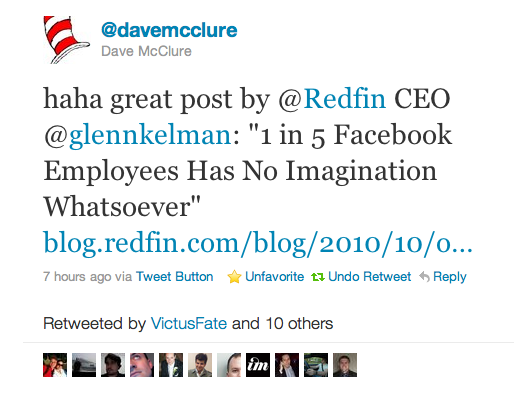
Glen Kelman posited this inflammatory statement yesterday on Redfin's corporate blog, One in Five Facebook Employees Has No Imagination Whatsoever. While the title is link bait to members of the startup community, it's a topic worth further exploring. Here's the core of Glen's gripe with alpha employees transitioning from one big successful thing to another:
Whoa! Shocking news, guys. An engineer left Google for Facebook. The great Lars Rasmussen, creator of Google Maps and Google Wave, quit Google Thursday to join Facebook. This has, admittedly, happened before. In June, Matthew Papakipos defected from Google’s Chrome team. In May, it was mobile guru Erick Tseng. Even Facebook’s chef, Josef Desimone, was recruited from Google.
In fact, someone over at Google must feel like the coach of Cuba’s national baseball team. Of the 2,174 current Facebook employees with a LinkedIn profile, 378 cited Google in their work history, or nearly 1 in 5. What’s remarkable about their decision isn’t the aplomb of Facebook recruiting, but the lack of imagination of Facebook’s Google recruits.
What’s the point of leaving one unassailable Internet platform where all your friends work for another unassailable Internet platform where all your friends work? It’s like getting a divorce to marry your wife’s sister.
To outsiders looking in we're curious about the rationale for jumping from one huge stratospheric ship to another. Certainly there are financial reasons to getting healthy options in a pre IPO company. Is there more that top technical people desire, to hack society (impact), to be famous, to be a legend?
My position and response to Glen's post:
Different levels of comfortable risk. Some incredibly talented producers prefer employment to founding. Early employees get small equity at small chances of a big outcome.
What you're getting at is motivation. If you're purely motivated by wealth and want to get to a position where you have the most freedom in the future, moving laterally from Google to Facebook is an attractive switch. More power to their boring decisions.
Maybe fresh startups are the ones to blame. Maybe we're not bending what can be done far enough to attract great minds to our cause.
Where do Tiny Startups Fit In?
Part of the problem is that smaller startups need to stand for something. Glen went on to soften the blow of his original statement with an update at the end of his post:
Update: some folks at Facebook have taken me to task for the tongue-in-cheek headline calling out their creativity. I’m sorry. I hadn’t meant that seriously. The people moving between Google and Facebook are obviously the gods of Silicon Valley, people who belong on bubble-gum trading cards. And just judging by its product you can tell that Facebook is a stunningly creative company.
This type of apologetic attitude weakened his original message, and goes a long way to explaining why smaller startups fail to attract top talent. You don't say I'm sorry, you say Good Game to the other side whether they win or lose. Why would alpha designers and hackers (builders) choose to be employee N at some tiny startup instead of starting their own companies?
I'd like to see the blame shifted where it belongs, to the shoulders and backs of startups who are unable to attract builders. First we pitch a concept to potential users/customers. Then if they don't laugh too hard we pitch the prototype to other folks who can help us Macgyver it together. If the project gains a little bit of momentum at this stage, we make a run at it by pitching outside investors or bootstrapping.
If startups want to seduce fantastic talent from big companies we're going to have offer something sexier than FU money because that's what Facebook is using to hire new employees right now. And that's hard for anyone to resist.